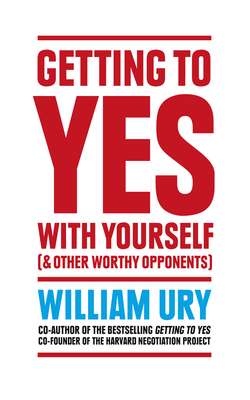Читать книгу Getting to Yes with Yourself: And Other Worthy Opponents - William Ury - Страница 7
Our Worthiest Opponent
ОглавлениеWhether we think of it or not, each of us negotiates every day. In the broad sense of the term, negotiation simply means the act of back-and-forth communication trying to reach agreement with others. Over the years, I have asked hundreds of audiences the question “Who do you negotiate with in the course of your day?” The answers I receive usually start with “my spouse or partner” and “my children,” continue on to “my boss,” “my colleagues,” and “my clients,” and finally to “everyone in my life all the time.” But, every so often, one person will answer: “I negotiate with myself.” And the audience inevitably laughs—with the laughter of recognition.
The reason why we negotiate is, of course, not just to reach agreement but to get what we want. Gradually, over the decades of mediating in a variety of difficult conflicts, from family feuds and boardroom battles to labor strikes and civil wars, I have come to the conclusion that the greatest obstacle to getting what we really want in life is not the other party, as difficult as he or she can be. The biggest obstacle is actually ourselves. We get in our own way. As President Theodore Roosevelt once colorfully observed, “If you could kick the person in the pants responsible for most of your trouble, you wouldn’t sit for a month.”
We sabotage ourselves by reacting in ways that do not serve our true interests. In a business dispute, one partner calls the other a liar in the press, shaming the other, who launches a lawsuit that is highly costly for both. In a sensitive divorce conversation, the husband loses his temper, lashes out at his wife, and storms out, undermining his own expressed interest in resolving the issue amicably for the sake of the family.
Underlying our poor reactions in moments of conflict is an adversarial “win-lose” mindset, the assumption that either we can get what we want or they can—but not both. Whether it is business titans struggling for control over a commercial empire or children fighting over a toy or ethnic groups quarreling over territory, the unspoken premise is that the only way one side can win is if the other loses. Even if we want to cooperate, we are afraid that the other person will take advantage of us. What sustains this “win-lose” mindset is a sense of scarcity, the fear that there is just not enough to go around, so we need to look out for ourselves even at the expense of others. All too often, the result of such “win-lose” thinking is that all sides lose.
But the biggest obstacle to our success can also become our biggest opportunity. If we can learn to influence ourselves first before we seek to influence others, we will be better able to satisfy our needs as well as to satisfy the needs of others. Instead of being our own worst opponents, we can become our own best allies. The process of turning ourselves from opponents into allies is what I call getting to yes with yourself.
